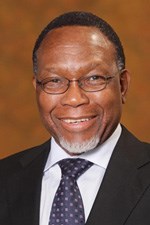
Top stories

Marketing & MediaAds are coming to AI. Does that really have to be such a bad thing?
Ilayaraja Subramanian 2 hours





More news











ESG & Sustainability
Crisis for Deaf South Africans as video relay service provider faces closure





In a statement issued by Cabinet Spokesperson Jimmy Manyi, it is reported that BUSA welcomed the formation of the government Inter-Ministerial Committee on the GFIP and urged that there should be in-depth consultations with all stakeholders.
This emerged from a meeting on Friday, 15 June 2012, between government - led by Deputy President Kgalema Motlanthe - and Business Unity South Africa (BUSA).
The meeting at the Sandton Convention Centre focused on infrastructure development, labour legislation and the Gauteng Freeway Improvement Project.
Deputy President Kgalema Motlanthe was accompanied by the Ministers of Transport and Economic Development, the Minister for Performance Monitoring and Evaluation, and the Deputy Ministers of Finance and Public Enterprises.
BUSA was represented by a broad range of members including chambers of commerce and industry, the Banking Association of South Africa, the Chamber of Mines, the Business Women' Association and a range of sectoral associations.
BUSA Vice-President Brenda Madumise said that for several years, South Africa had pursued sensible macro-economic policies.
However, for South Africa's economic performance to be enhanced and sustained over the longer term, business and government needed to work effectively towards addressing the microeconomic constraints to growth, such as infrastructure and logistical backlogs, telecommunications, the security of water and electricity supply, competitiveness and productivity.
BUSA assured government that business was willing and ready to help wherever possible, given that it had the project management, process and administration skills to help government address capacity shortfalls as quickly and efficiency as possible.
Deputy President Motlanthe welcomed the interest shown by BUSA in the GFIP and said government appreciated the views and suggestions of the public and various organisations on the GFIP.
Government and BUSA exchanged information and views on the New Growth Path and associated infrastructure projects, including the constraints faced by the public and private sectors. BUSA made a strong plea for the regulatory impact assessment to be widened and deepened in official decision-making.
BUSA raised its concerns on proposed amendment to the labour legislation. aspects of labour legislation that business viewed as inhibiting growth and employment. BUSA urged that the labour law amendments be subjected to a further regulatory impact assessment and also that the government should implement a youth wage subsidy with the necessary safeguards.
Deputy President assured BUSA that government was not hasty in passing amended labour legislation and said the views of business and workers would be canvassed more extensively within Nedlac and other channels.
The meeting agreed that more periodic engagements between government and business would be explored.
BUSA and government agreed on the need to make the planned infrastructure summit in July a success and that business would seek to play a positive role.
Government said it was itself concerned about the manner in which some public-private partnerships (PPPs) were structured and urged that government and BUSA should apply their minds to a better model for PPPs.